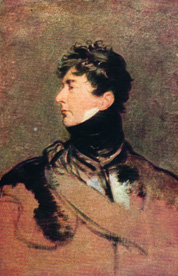George IV
About George IV

Eldest son of George III. Born 1762. Prince Regent 1811-1820. Crowned at Westminster. Married to the Princess Caroline of Brunswick, by whom he had one child, the Princess Charlotte of Wales, married to Prince Leopold of Belgium. The Princess died 1817, shortly after her marriage.
There were quarrels between the Prince Regent and his wife, which ended in her trial before the House of Lords on a charge of infidelity, which provoked controversy at the time among all classes. On his accession to the throne he hoped to obtain a dissolution of his marriage with Queen Caroline; but such was George IV.'s unpopularity that any measures to that end had to be dropped.
No English monarch's private life from his younger days, as prince, to old age-he died at 68 -has been laid so bare, and so severely animadverted upon, as George IV.'s. The facts of his career - not always too charitably related - have been disclosed in memoirs, biographies, and books of gossip, untold in number.
"Nature and circumstance had done their utmost to prepare the Prince for being spoiled: the intolerable dullness of his father's court, its stupid amusements, its dreary occupations, the maddening humdrum, the stifling sobriety of its routine would have made a scapegrace of a much less lively Prince."
He was not lacking in courage of a kind, like his father; and he was good-natured; "an indolent and voluptuous Prince, not unkindly." Such is the verdict most favourable to him, delivered, after fullest inquiry and consideration, by perhaps the severest of all his critics, Thackeray. "With vices and weaknesses of the lowest and most contemptible order, it would be difficult to find a disposition more abundantly furnished." (The Greville Memoirs.)
De mortuis nil nisi bonum; or, as much good at least as may be said. If not, say no more. Nothing, indeed, remains to be said of "the First Gentleman of Europe" that has not been repeated over and over again in published books: Thackeray's Four Georges, the Greville Memoirs, and the rest.
Politically, the greatest measure of his reign was an Act admitting Roman Catholics to Parliament, and to all but a few of the highest posts, civil or military, in the service of the Crown, a long needed and long debated reform.